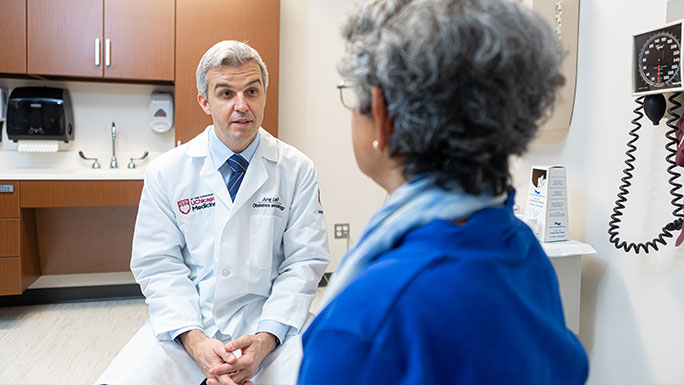Genitourinary and Rectovaginal Fistulas

Effective fistula treatment requires advanced care with an experienced team of specialized urogynecologic surgeons. At the University of Chicago Medicine, our experts will design a personalized plan to repair your fistula and improve your quality of life.
What is a Fistula?
A fistula is an abnormal connection between two organs and can occur in any part of the body. In the pelvis, fistulas usually form between the vagina and either the urinary tract (bladder, urethra and/or ureters) or the gastrointestinal (digestive) tract (rectum, colon and/or small bowel). A fistula can also form between the gastrointestinal tract and the urinary tract without involving the vagina.
What are Fistula Symptoms?
Pelvic fistulas can cause distressing and embarrassing problems, like uncontrollable leakage of urine or stool from the vagina. Complex fistulas can develop when multiple organs are involved and, in these cases, urine, gas and stool can leak through the vagina.
Other symptoms of pelvic fistulas may include:
- Frequent urinary tract infections
- Inability to hold urine (urinary incontinence)
- Inability to hold stool (fecal incontinence)
Types of Fistulas and Causes
- Vesicovaginal fistula: A connection between the vagina and the bladder
- Ureterovaginal fistula: A connection between the vagina and the ureter, which is the tube that drains urine from your kidneys to your bladder
- Urethrovaginal fistula: A connection between the vagina and the urethra, which is the tube that drains the bladder as you urinate
Pelvic surgery, specifically hysterectomy, is the most common reason fistulas form between the urinary tract and the vagina. They typically develop either immediately after surgery or within one to two weeks. The main symptom is usually constant, uncontrollable leakage of urine through the vagina.
- Rectovaginal fistula: A connection between the rectum and the vagina, also called an obstetric fistula. These may develop after a vaginal tear during childbirth or from other causes, such as inflammatory bowel disease, cancer and radiation therapy.
- Colovaginal fistula: A connection between the colon (large bowel) and the vagina. Fistulas between the colon and vagina or the urinary tract often occur as a complication of diverticulitis, which is an infection of the diverticula in the large intestine.
- Fistula in-ano: An anorectal condition connecting the anal canal and the perineal skin, which surrounds the anus. Patients with inflammatory bowel disease are at risk to develop this type of fistula.
When a fistula occurs between the vagina and the gastrointestinal tract, the main symptom is the passing of gas or leakage of stool through the vagina.
- Colovesical fistula: A connection between the colon and the bladder. This type of fistula may occur after surgery, radiation or diverticulitis.
Testing and Diagnosis for Fistulas
Your urogynecologic surgeon may suspect a fistula based on your medical history and a comprehensive physical exam. Additional tests are often needed to confirm the diagnosis and identify the type of fistula, which is critical to successfully treat your symptoms.
Some of the diagnostic tests available include:
- Radiologic Imaging:
- Computer tomography (CT) of the abdomen and pelvis, typically with contrast (dye) that is given vaginally and rectally
- Magnetic resonance imaging (MRI), typically with contrast that is given vaginally and rectally
- Barium enema X-ray of the abdomen after filling the colon with a liquid contrast
- Cystoscopy: An in-office exam looking inside the bladder and the urethra with a thin camera
- Anoscopy: An in-office exam of the anus and the rectum
- Colonoscopy: An exam of the rectum and colon with a flexible camera, usually done under sedation (“twilight”) or general anesthesia
Treatment for Genitourinary and Rectovaginal Fistulas
Fistulas do not usually heal on their own. In most cases, surgery is needed to correct the problem and should only be performed by a urogynecologic surgeon with specialized training in fistula repair.
Fistula repair surgery involves removing the fistula tract and repairing affected organs so they are no longer connected. It can be successfully performed using minimally invasive techniques (laparoscopic, robotic and through the vagina) to enhance healing and recovery. Whenever possible, treatment of the underlying cause of the fistula should occur before surgery to maximize its success.
Our Fistula Treatment Specialists
At UChicago Medicine, our fellowship-trained urogynecologic surgeons are experts in fistula repair. The Center for Pelvic Health also brings together experts from multiple specialties, including urogynecology, colorectal surgery, urology and radiology to provide coordinated care for our patients who have more complicated cases requiring a multidisciplinary approach.
Meet Our Urogynecologists

Urogynecology and Reconstructive Pelvic Surgery

Urogynecology and Reconstructive Pelvic Surgery

Urogynecology and Reconstructive Pelvic Surgery

Urogynecology and Reconstructive Pelvic Surgery

Urogynecology and Reconstructive Pelvic Surgery
